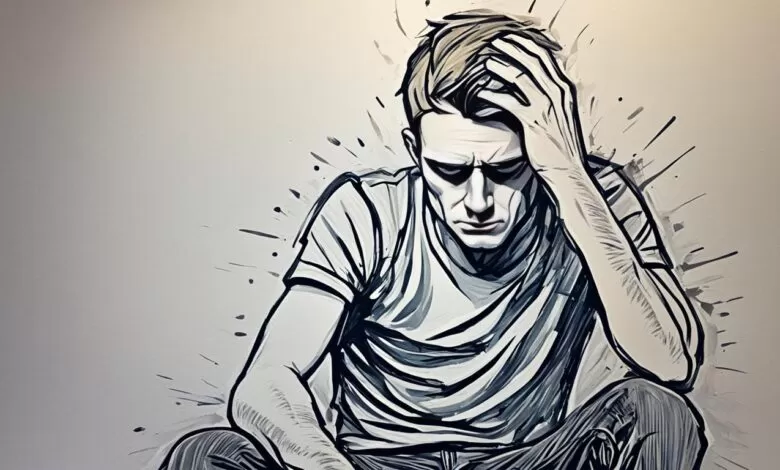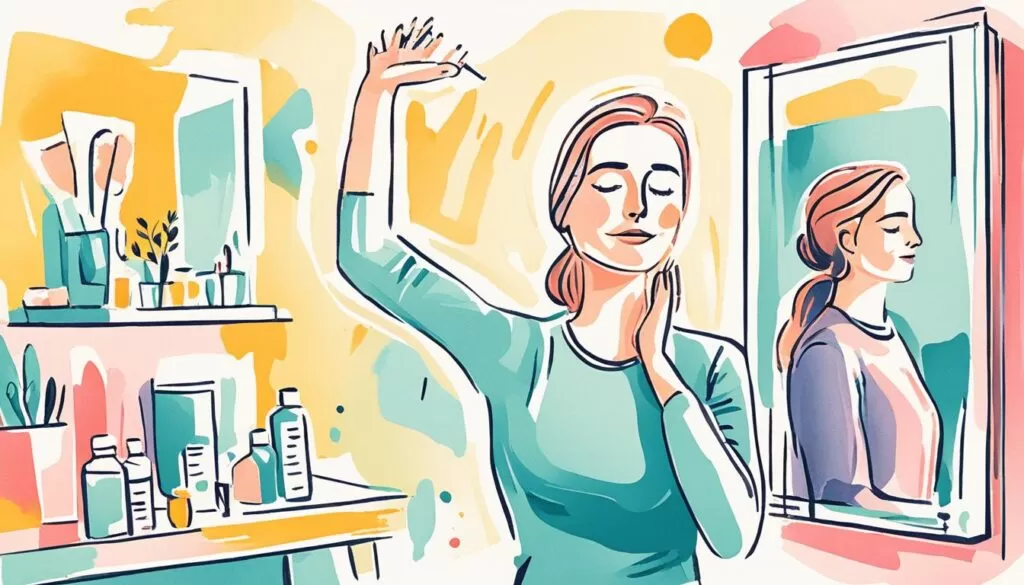Recognizing Depression: Top 10 Signs and Symptoms

Looking into our mental health is more than academic. Every change in how we act can be a hint of depression. With mental illness affecting many people, sadness often comes with anxiety. Knowing the top 10 signs of depression can lead us to help and care.
When does life’s ups and downs start to signal depression? Depression remains a common yet complex mental health issue. It looks like normal sadness but is much more. Distinguishing between short-term sadness and depression’s deep sorrow is crucial. To do this, examining our emotional health and depression’s signs is key.
Understanding Depression and Its Impact on Emotional Well-being
To really get what depression is about, we should see how deeply it affects someone’s feelings. This condition goes further than just being sad; it changes how a person feels and touches every part of their life. People with depression deal with heavy guilt, feel really bad about themselves, and get annoyed easily. Knowing these signs early is key to help them sooner.
Depression isn’t just in the mind; it shows up in the body too. It can make someone feel super tired, mess with their eating or weight, and ruin their sleep. It’s important to see all these physical signs to treat depression the best we can.
Depression also shakes up someone’s social life. It makes people pull back from friends, drop their hobbies, and struggle with work and relationships. This doesn’t just hurt the person with depression; it affects everyone around them, like family, co-workers, and the whole community.
| Dimension | Impact | Symptoms |
|---|---|---|
| Psychological | Decreased Self-esteem, Guilt | Low mood, Irritability |
| Physical | Loss of Energy, Appetite Changes | Sleep Disturbances, Weight Fluctuations |
| Social | Interpersonal Challenges, Withdrawal | Neglect of Hobbies, Work Difficulties |
Understanding depression fully means looking at it from all angles. We must see it as a serious illness that needs a lot of care, loving support, and a strong promise to make life better for those who are dealing with it.
The Interconnection between Depression and Anxiety
The link between depression and anxiety is often overlooked but is crucial for a full mood disorder diagnosis. Studying their connection reveals a mix of emotional signs. This mix makes it hard to tell them apart and complicates treatment plans. Understanding their relationship is key for proper care.
Depression and anxiety affect people both emotionally and physically. Those facing these issues may feel even more stressed in daily life. This makes daily tasks and socializing much harder.
Both depression and anxiety share commonalities in their emotional symptoms, including pervasive worry and a debilitating sense of hopelessness that can erode a person’s quality of life and overall well-being.
Treating these conditions together is vital. Doctors focus on crafting treatments that address both mental health conditions. They know it’s important to treat both as part of mood disorder diagnoses.
This connection doesn’t just affect individuals; it also drives research. By studying these issues together, experts hope to find better ways to help. Their goal is to improve care for those dealing with both anxiety and depression.
Top 10 Signs and Symptoms of Depression
Identifying the signs of depression is vital. It helps to recognize the need for help. Depression affects not just the mind but also one’s body and social life. Here are the key signs of this condition:
Persistent Sadness and a Low Mood
An ongoing feeling of sadness is a clear sign of depression. It makes daily tasks hard.
Lack of Interest in Previously Enjoyed Activities
Loss of interest in favorite activities is a warning sign. It shows a hit to emotional well-being.
Significant Weight or Appetite Changes
Weight and appetite changes show the emotional struggle. They are physical signs of depression.
Sleep Disturbances or Excessive Sleeping
Sleep issues like insomnia or too much sleep indicate depression. It means the body’s rhythm is disturbed.
Feelings of Worthlessness or Excessive Guilt
Depression often brings feelings of worthlessness. This is joined by harsh self-criticism.
Physical Symptoms: Aches and Unexplained Pains
Aches and pains without a clear cause point to depression. They reveal the connection between mind and body.
Social Withdrawal and Reduced Social Engagement
Pulling away from social events is a sign. It shows depression’s impact on social life.
Concentration Difficulties and Indecisiveness
Depression makes focusing hard. It also makes decisions tough to make.
Decreased Energy and Increased Fatigue
Feeling drained or tired even after resting is a clue. It suggests depression might be present.
Recurrent Thoughts of Death or Suicide
Thoughts of suicide are the most alarming signs. They show a deep need for help.
Addressing these signs with the right support is crucial. It can greatly help and even save lives.
Addressing Behavioral Changes in Depression
Addressing behavioral changes in those with depression is key for healing and maintaining psychological health. Symptoms like irritability and restlessness are common and need attention. Besides the inner turmoil, changes in daily life, including troubles in relationships and less productivity, show how deeply depression affects people.
By being understanding and kind in coping with depression, we help affected people take back control of their emotions and lives. We should promote open conversations, provide professional help, and create a stigma-free environment. These actions lead to healthier individuals and communities.

Each change in behavior can signal improvement or a warning, needing custom care and ongoing attention. Here’s a quick look at common behavioral changes seen in depression and how to address them.
| Behavioral Change | Observations | Considerations for Addressing |
|---|---|---|
| Social Withdrawal | Less contact with friends and family, reduced social activity. | Encourage small gatherings, promote one-on-one interactions. |
| Work Performance Decline | Mistakes, missed deadlines, absenteeism. | Professional counseling, modified workload, flexible scheduling. |
| Restlessness or Agitation | Fidgeting, inability to relax, heightened irritability. | Stress management techniques, mindfulness exercises, physical activity. |
| Risk-Taking Behaviors | Substance abuse, reckless driving, unsafe sex. | Emergency intervention, harm-reduction strategies, support groups. |
| Neglect of Personal Responsibilities | Ignoring bills, poor hygiene, skipping appointments. | Involvement of caretakers, reminders, financial counseling. |
Coping with depression varies from person to person, so addressing behavioral changes requires a custom and patient-focused plan. By working together, healthcare providers, caregivers, and communities can offer understanding and support to those battling depression’s symptoms.
Psychological Health: More Than Just Sadness
Understanding psychological health is about more than not being sad. It’s about the different sides of depression symptoms. These include feeling really low all the time and having a deep sense of despair. It’s important to face and deal with feelings of hopelessness and experiencing guilt. This is essential for keeping your emotional health in check and handling mental illness well.
Those dealing with depression often feel trapped by hopelessness. This can make it hard to see things clearly and make good decisions. Also, feeling guilty can throw someone into deep emotional distress. This happens no matter what they actually did or didn’t do.
“Identifying and addressing these emotional undercurrents are critical in the holistic management of depression, providing avenues for recovery and resilience.”
The journey to psychological health isn’t just for those with symptoms. It’s something society should work on together. We need to make sure everyone understands emotional health and knows how to deal with mental illnesses. Actions like spreading awareness, providing healthcare, and stopping the stigma against mental illness are key. Together, we can change the story from one of despair to one of healing and hope.
The Physical Realm: When Depression Manifests in the Body

Depression is often seen as an emotional issue, but it also strongly affects the body. It creates physical symptoms that make life harder for those suffering. These symptoms add to the emotional pain, making everyday tasks more challenging.
Movement and Speech Alterations
Depression can change how a person moves and talks. They may speak slower, pause more, and move less. These changes show how deeply depression can affect a person’s physical state.
Gastrointestinal Issues and Changes in Appetite
Depression often leads to constipation and other stomach problems. This shows the link between our minds and gut health. Changes in appetite, leading to weight gain or loss, also occur, raising nutritional concerns.
Table outlining common digestive issues associated with depression:
| Symptom | Description | Related to Depression |
|---|---|---|
| Constipation | Difficulty in bowel movements. | Yes |
| Bloating | Excessive gas and discomfort in the stomach. | Often |
| Nausea | Sensation of unease and discomfort in the stomach with an urge to vomit. | Sometimes |
Unexplained Energy Loss
Depression drains energy, leaving one always tired without a clear reason. This loss of energy makes daily tasks hard and reduces enjoyment of life.
Disrupted Sleep Patterns
Sleep problems are common with depression, including too little or too much sleep. Lack of restful sleep worsens depression, affecting both night and day.
Depression’s physical effects show it’s not just an emotional issue. It causes real pain and tiredness. Understanding and treating depression means looking at both the mind and body.
Depression in the Social Sphere: Isolation and Its Effects
The world of depression social symptoms is both broad and complex. It touches people in unique ways. For many, depression leads to social isolation and social withdrawal. This separation can grow slowly, pulling people away from friends and family. It also makes social life more difficult.
One key problem is relationship difficulties. These issues come from continued withdrawal from social life. Trouble keeping up with friends can cause misunderstandings and feelings of being left out. Also, pulling back from engagement in social activities shows the struggle within. It also makes the person’s depression worse by adding to their feelings of being alone.
Depression quietly eats away at a person’s daily involvement in activities. To see this clearly, look at the table below. It shows the difference between healthy social involvement and how depression changes that:
| Healthy Social Involvement | Impacted by Depression |
|---|---|
| Regular catch-ups with friends and family | Cancellation of plans, avoidance of gatherings |
| Active participation in hobbies and group activities | Loss of interest in hobbies, no desire to join |
| Maintaining supportive and nurturing relationships | Difficulty in expressing feelings, strained relations |
| Commitment to work and social responsibilities | Frequent absences or disengagement at work and social roles |
| Frequent, positive social interactions | Isolation and declining number of social contacts |
The way depression affects social life goes further. It can touch your work, your family, and how you fit into society. Spotting and dealing with these social symptoms is key. They are important in both understanding depression and recovering from it. By building supportive spaces, we can close the distance created by depression. This helps mend social connections and encourages people to join the world again.
Depression is as much about the absence from one’s social world as it is about the emotional turmoil within. Reconnecting with that world is often an essential step in the journey to recovery.
Grasping the Severities of Depression: From Mild to Severe
Depression is more than just feeling sad. It includes emotional, physical, and psychological challenges. People experience it in many ways. At one end, there’s mild depression that feels like constant sadness or lack of drive. At the other, severe depression can disrupt someone’s life with extreme symptoms like delusions. Knowing the level of depression is key to finding the right help.
Even mild depression needs attention and care. It doesn’t stop someone from living their life, but it can lessen their joy. When depression is moderate, it makes daily tasks hard and can cause more health issues. Severe depression is even tougher, stopping people from doing basic things. They need urgent and strong care. Each level needs a different kind of support to help someone recover.
It’s important to understand how depression shows up differently in people. This helps in giving the right kind of care. Knowing the differences in depression levels helps doctors, patients, and families work better together. As we learn more about mental health, our goal is to give people with depression the help they need. We want to help them find their way back to strength and hope.






